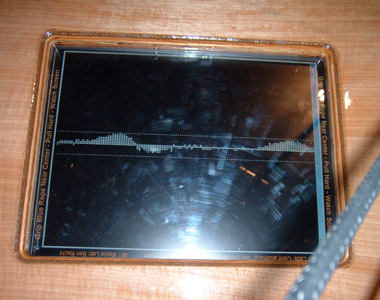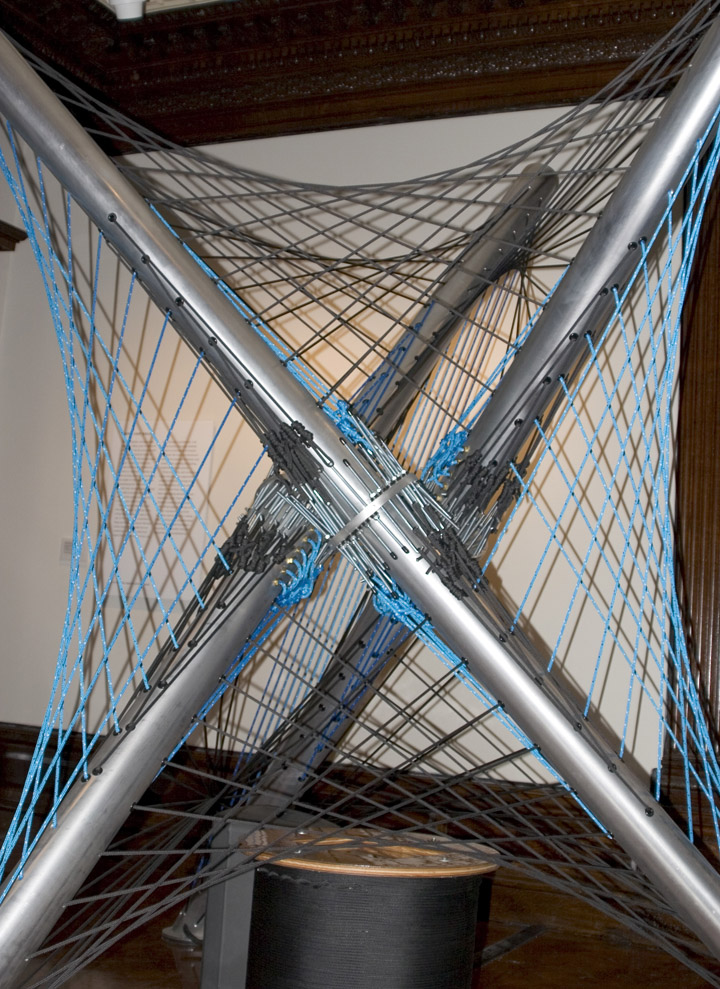 |
|
|
"Rope and Sound"

 Listen to an audio sample
Listen to an audio sample
- What
- A unique interactive musical harp using novel electronic sensing rope technology
- Where
- When
- Showing April 9 through October 30, 2005.
- Press
- By
- Colin Bulthaup, Squid Labs - Design
- Dan Goldwater, Squid Labs - Design, Electronics, Software, Rope, Project Management
- Saul Griffith, Squid Labs - Design, Structural, Mechanical, Rope
- Ben Recht, MIT Media Lab - Design, Sound
- Eric Wilhelm, Squid Labs - Design
- Copyright 2005, Squid Labs LLC
- About (museum sign text)
-
Nylon, polyester and advanced polymeric fibers such as Spectra
and Kevlar can be combined with integrated conductive
fibers to transform conventional rope applications.
Conductive fibers are braided with traditional fibers to produce a rope that is capable both of carrying a
load and monitoring the weight of that load.
Squid Labs is developing this technology to provide
load, abrasion and localised wear information to
assist rope users in assuring the quality and
reliability of their ropes while in service.
-
We envision that intelligent, self-monitoring ropes
such as these may be used everywhere from mooring huge
ships at anchor to the hands of rock climbers
indicating when the ropes have been damaged by
abrasion or overstrained by a fall. These ropes may be
used for safety applications such as seat-belts,
lifting ropes and slings; architectural applications
such as membrane structures and tents; naval
applications such as towing lines, mooring lines and
automated sheeting of sails; and for recreational
applications on small boats and yachts, on kites and
for mountaineering.
-
The rope acts as its own strain gauge, monitoring
tension constantly while the rope is in use. In this
installation, changing the tension in the blue active
ropes creates an electrical signal that modulates the music that you hear through a synthesizer. Just as the
human muscular-skeletal system is a tensegrity of
muscle and bone, the ropes and aluminum tubes form a
tensegrity of tension and compression, pushing and
pulling, weightlessness and gravity.
- Usage
- Grip any blue rope near the center of the rope
- Pull hard - don't be afraid! some ropes are easier than others, try a few if it doesn't make a sound
- Watch the display screen when you pull
- Size
- 9 feet high, 8 feet wide, 8 feet deep
- approximately 500 pounds
- three main struts are 12.5 feet long, 5.5 inch
diameter.
- Form
- Based on the Tensegrity structures of Buckminster
Fuller. The three main struts are held in place only by the
tension of the ropes, they are not attached to each other or to the
floor. A "standard" three-strut tensegrity of similar form has
nine ropes required to hold it up. Here we have replaced each of
those nine ropes with a spline of twelve, resulting in 108 total ropes.
The resulting structure is surprisingly sturdy, it can easily support hundreds
of pounds from the top end of each main strut with negligible deformation. This
makes sense once you consider that the tension on each of the 108 ropes is between 50
and 150 pounds.
- Function
- Black ropes (72) - structural
- Blue ropes (36) - structural and sensing. These
showcase our Electronic Sensing
Rope technology. Pulling on a blue rope causes an elastic
deformation of the rope which modulates its electrical
properties. The change in electrical properties is detected by a
computer, which plays a different synthesized sound for each rope.
- Electronics - All electronics are in a custom enclosure shaped like a large spool of rope,
which sits under the main structure.
- Display - central computer display screen shows the activity on all ropes (see screen shots below).
The display shows some of the data sensed from the ropes, giving a
finer grain of visual feedback than the sounds provide. The display has dotted
lines showing how much pull is needed to make a sound, helping to correlate visual
and audio stimuli.
- Materials
- Main struts - 6061 Aluminum, brushed
- Feet - 6061 Aluminum, 50D Urethane rubber
- Hardware - Zinc-plated Steel, Oxide-coated steel, Stainless Steel, Nylon, Delrin, Brass
- Black ropes - polyester 1/4" yacht rope
- Blue ropes - Custom developed by Squid Labs.
Construction somewhat similar to the black ropes, but with a special active core.
The sheath is a standard blue polyester. The active core is composed from
a mix of polyester and discontinuous stainless steel fibers.
- Questions and Answers
- Where did the idea for this come from?
- How do you tune it?
- It is not tuned like a guitar. The sounds you hear are synthesized, they are not based on the
vibration frequency of the rope like a normal stringed instrument. When the rope is pulled more than a certain
amount, the computer plays a sound specific to the rope which was pulled. Pulling harder won't change the
sound like with a guitar, on the other hand it never goes out of tune and it can make some very fun
sounds - any sound we want really.
- What are the sounds it is making?
- There are three sets of twelve blue ropes. One set sounds like bells or wind chimes. The 2nd set
sounds like a dulcimer or xylophone. The 3rd set has a variety of fun percussion sounds.
- What is inside the three metal struts?
- Just a lot of knots and wires, and lead weights at the base. There are no sensors or electronics or
pickups. The rope is the sensor.
- How do the metal struts not tip over?
- That is the magic of the tensegrity structure.
It looks like it should just fall down, but in reality it is incredibly strong and stable.
Each rope is pulling in a different direction on the struts,
so no matter what direction you try to pull or tip a strut, there is a rope holding it in place.
- What is inside the rope spool?
- a computer with data acquisition board, a power supply, a fan, a monitor, a custom circuit board with signal filters, a power
strip, a lot of wires and
connectors.
|
|







